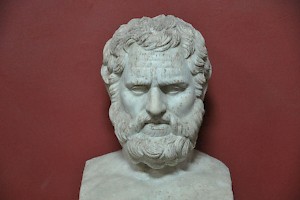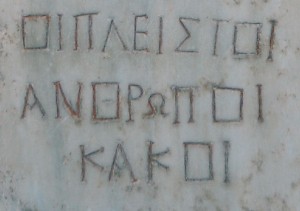Bias of Priene
Bias of Priene (first half sixth century BCE): Greek politician, one of the Seven Sages.

There's not much we know for certain about Bias of Priene. His biography, written by Diogenes Laertius in the late second century CE, has some length, but does not appear to be very reliable: the first half contains some stereotypical anecdotes that may have been told about every wise person, while the second half contains several maxims that are not terribly inspiring either. Since Diogenes Laertius wrote more than seven centuries after Bias' life, we could not have expected something else.
We gain more certainty when we read Herodotus' Histories, which were composed about a century after Bias. Herodotus tells us that Bias, when the Persians had defeated the Lydian king Croesus (after 547 BCE), advised the Greeks of Asia Minor to leave their cities and migrate to the far west, and build a new city on Sardinia. The author of the Histories adds that he considered this to be a very wise proposal, apparently unaware that Sardinia, at this moment, was a Carthaginian possession that could not be colonized.note
There's a second remark about Bias in the Histories. Several years before the Persians came, the Lydians had tried to conquer the Greek isles in the Aegean sea. According to Herodotus, either Bias or Pittacus of Mytilene had visited king Alyattes, and had convinced him not to launch a sea-borne expedition.note The story - essentially just a witty remark - may be untrue, but suggests that later generations associated Bias with the wars against the Lydians; Diogenes Laertius seems to corroborate this when he describes a stratagem that saved Priene when it was under siege.note

Diogenes Laertius adds several bits and pieces. In the first place, he mentions Bias' good reputation as an orator,note quoting as evidence a line from the poet Hipponax, who was a contemporary of Bias. The author of the Lives of the Philosophers also informs us that Bias' father was called Teutames, and that the inhabitants of Priene built a sanctuary for Bias, called the Teutameion.note Finally, Diogenes quotes several maxims, including the pessimistic remark that most people are evil; it is debatable whether these lines are authentic.note
Aristotle (384-322 BCE) records a tradition that Bias acted as judge in a boundary dispute between Priene and Samos;note Plato (427-347 BCE) mentions Bias as one of the Seven Sages.note